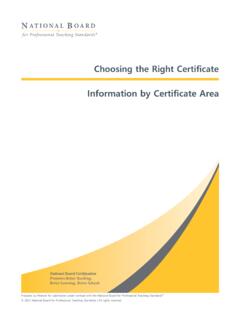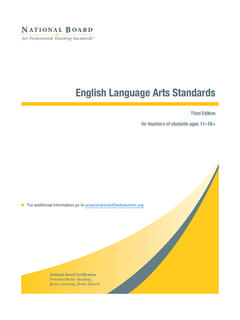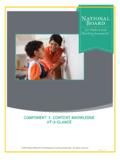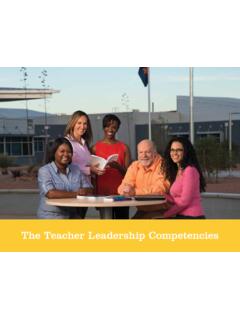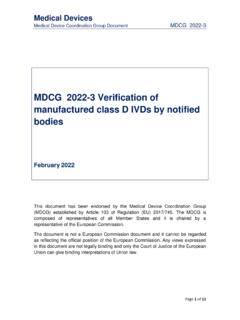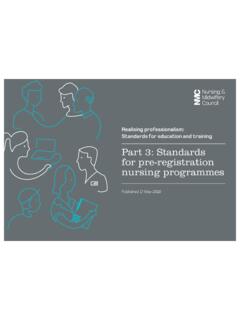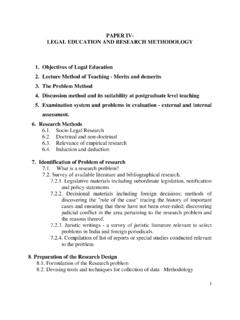Transcription of Scoring Guide: Understanding your Scores
1 Scoring Guide Understanding Your Scores Prepared by Pearson for submission under contract with the National Board for Professional Teaching Standards 2021 National Board for Professional Teaching Standards | All rights reserved. Version Scoring Guide 2021 National Board for Professional Teaching Standards | All rights reserved. Version Table of Contents How the Five Core Propositions and Standards Inform the Assessments and Scoring .. 1 The Five Core Propositions .. 1 The Standards and Their Role .. 3 Who Are the Assessors? .. 3 How the Assessors Use the Standards .. 3 Assessor Training .. 4 Bias-Prevention Training .. 4 How Is the Assessment Scored? .. 5 Certification Components and Sections .. 5 Scoring Selected Response Items .. 5 Scoring Constructed Response Items and Portfolio Components.
2 5 Scoring Procedure for Constructed Response Items and Portfolio Components .. 7 Score Requirements for Achieving Board Certification .. 9 The Three Score Requirements .. 9 What You Need to Know about the Three Score Requirements .. 9 How Were the Three Score Requirements Determined? .. 10 World Languages Requirement .. 10 Understanding Your Score Report .. 11 Accessing Your Score Report .. 11 Understanding Your Score Report .. 11 A Note about Scores and Weights .. 17 Accessing Your Score History .. 19 Evaluating Your Performance .. 20 Using the Rubric to Evaluate Your Performance .. 20 Evaluating Your Performance on Component 1: Content Knowledge .. 21 Evaluating Your Performance for Portfolio Components 2 4 .. 22 Understanding the Standardized Feedback Statements for Portfolio Components .. 30 Standardized Feedback Statements for Your Portfolio Components.
3 31 Identifying Your Strengths and Weaknesses .. 42 Scoring Guide 2021 National Board for Professional Teaching Standards | All rights reserved. Version Preparing for the Next Assessment Cycle .. 43 What Happens to Your Scores ? .. 43 Important Completion and Retake Rules .. 43 Retake Considerations .. 44 Maximum Number of Allowed Retake Attempts .. 44 Score Calculator .. 45 Selecting Your Retake Components .. 46 Example Retake Scenarios .. 47 Rules for Retaking Portfolio Components .. 54 Retake Fees and Deadlines .. 55 Filing an Appeal .. 55 Ways to Prepare for the Next Assessment Cycle .. 55 Next Steps .. 56 Appendix: Appeal Process .. 57 Filing an Appeal .. 57 Using the Score Verification Service .. 57 Applying to Retake While Filing an Appeal .. 57 Establishing Good Cause .. 57 Procedure and Timeline .. 58 Scoring Guide 1 2021 National Board for Professional Teaching Standards | All rights reserved.
4 Version How the Five Core Propositions and Standards Inform the Assessments and Scoring The National Board Certification process is designed to collect standards-based evidence of accomplished practice. In all 25 certificate areas, candidates for National Board Certification must complete four components: Assessment Center Section Component 1: Content Knowledge Portfolio Section Component 2: Differentiation in Instruction Component 3: Teaching Practice and Learning Environment Component 4: Effective and Reflective Practitioner The Five Core Propositions The essence of the National Board s vision of accomplished teaching is captured in the enduring document What Teachers Should Know and Be Able to Do ( ), at the heart of which are the Five Core Propositions. The National Board Standards and the assessments for all certificate areas are founded on the following Five Core Propositions that clearly state the commitment, knowledge, skills, and dispositions demonstrated by National Board Certified Teachers (NBCTs): 1.
5 Teachers are committed to students and their learning. Accomplished teachers base their practice on the fundamental belief that all students can learn and meet high expectations. They treat students equitably, recognizing the individual differences that distinguish one student from another and taking account of these differences in their practice. They adjust their practice based on observation and Understanding of their students interests, abilities, skills, knowledge, language, family circumstances, and peer relationships. They view students varied backgrounds as diversity that enriches the learning environment for every student. Accomplished teachers understand how students develop and learn. They consult and incorporate a variety of learning and development theories into their practice, while remaining attuned to their students individual contexts, cultures, abilities, and circumstances.
6 They are committed to students cognitive development as well as to students ownership of their learning. Equally important, they foster students self- esteem, motivation, character , perseverance, civic responsibility, intellectual risk taking, and respect for others. 2. Teachers know the subjects they teach and how to teach those subjects to students. Accomplished teachers have a rich Understanding of the subject(s) they teach and appreciate how knowledge in their subject is created, organized, linked to other disciplines, and applied to real-world settings. While maintaining the integrity of disciplinary methods, content, and structures of organization, accomplished teachers develop the critical and analytical capacities of their students so that they can think for themselves. Accomplished teachers command specialized knowledge of how to convey and reveal subject matter to students.
7 They are aware of the preconceptions and background knowledge that students typically bring to each subject and draw on pedagogical and subject matter understandings to anticipate challenges, modify their practice, and respond to students needs. They also demonstrate a commitment toward learning about new Scoring Guide 2 2021 National Board for Professional Teaching Standards | All rights reserved. Version strategies, instructional resources, and technology that can be of assistance. Their instructional repertoire and professional judgment allow them to generate multiple paths to knowledge in the subjects they teach, and they are adept at teaching students how to pose and solve their own problems so that they can continue exploring and advancing their Understanding . 3. Teachers are responsible for managing and monitoring student learning. Accomplished teachers view themselves as facilitators of student learning within dynamic instructional settings.
8 They create, enrich, maintain, and alter learning environments while establishing effective ways to monitor and manage those environments and the student learning that occurs within them. They possess a comprehensive knowledge of instructional methods, know when each is appropriate, and can implement them as needed. They use instructional time constructively and efficiently, customizing physical layout, resources, and instructional methods. They enlist the knowledge and support of a wide range of stakeholders to provide their students with enriched opportunities to learn. They understand the strengths and weaknesses of pedagogical approaches they may take, as well as the suitability of these approaches for particular students. Accomplished teachers know how to engage students in varied settings and group configurations. They create positive and safe learning environments that guide student behavior and support learning, allowing the schools goals for students to be met.
9 They are adept at setting norms for social interaction among students and between students and teachers. They understand how to motivate students and value student engagement, supporting them as they face and learn from challenges. Accomplished teachers assess the progress of individual students as well as that of the class as a whole. They apply their knowledge of assessment to employ multiple methods for measuring student growth and Understanding . They use the information they gather from monitoring student learning to inform their practice, and they provide constructive feedback to students and families. They collaborate with students throughout the learning process and help students engage in self-assessment. 4. Teachers think systematically about their practices and learn from experience. Accomplished teachers possess a professional obligation to become perpetual students of their craft.
10 Committed to reflective learning, they are models of educated persons. They exemplify the virtues they seek to inspire in students curiosity, honesty, fairness, respect for diversity and appreciation of cultural differences and the capacities that are prerequisites for intellectual growth: the ability to reason and take multiple perspectives, to be creative and take risks, and to adopt an experimental and problem-solving orientation. Accomplished teachers draw on their knowledge of human development, subject matter, and instruction, and their Understanding of their students to make principled judgments about sound practice. Their decisions are not only grounded in established theories, but also in reason born of experience. They engage in lifelong learning, which they seek to encourage in their students. Accomplished teachers seek opportunities to cultivate their learning.


